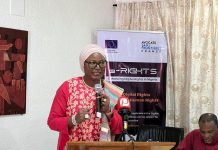The National Human Rights Commission (NHRC) has expressed serious concerns over the Gambia Armed Forces’ (GAF) noncompliance during the investigation into the alleged shooting of Mr. Stanislas Gomez, according to the Commission’s recently released 2024 State of Human Rights Report.
Mr. Gomez, who was a passenger in a vehicle, reportedly sustained injuries after being shot by a military officer at a checkpoint near 2Ray’s Restaurant along the Bertil Harding Highway.
The NHRC’s report also highlights a troubling pattern of unprosecuted murders across the country throughout the year, pointing to multiple cases where justice remains elusive.
“Since 2017, there have been no reported cases of enforced disappearances or extrajudicial killings carried out by the State. However, there has been a disturbing rise in murders committed by private individuals,” the report states.
It recounts several tragic incidents, including the stabbing death of a young woman at a forex bureau in January 2024, followed by additional murder cases in April and July. Notably, the discovery of an unidentified body in a gutter in Foni Kampant on July 21, 2024, and the ongoing investigation by the Gambia Police Force (GPF) into the alleged murder of a British national in Old Yundum, further underscore the urgent need for accountability.
The NHRC reaffirmed that the right to life obliges the state not only to refrain from unlawful killings but also to actively protect that right and hold violators—including private actors—accountable. “In situations characterised by widespread killings, States can be held accountable for their failure to address systemic causes adequately,” the Commission emphasised, calling for a comprehensive approach to public safety and justice.
GAF’s Resistance to Investigation
When NHRC investigators launched a fact-finding mission into Gomez’s shooting, they encountered resistance from GAF officers who denied access to the patrol team involved. The officers cited the need for prior approval from Chief of Defence Staff Mamat O. Cham. The Commission noted that formal requests for cooperation remain unanswered, raising serious concerns about transparency and accountability.
“Under human rights law, the State holds an obligation to protect the right to life beyond mere prohibitions of direct violations,” the NHRC stated. “They must proactively take appropriate measures to deter, prevent, investigate, prosecute, and punish violators.”
Recommendations for Action
In response to these issues, the NHRC has proposed several recommendations to strengthen efforts against unlawful killings and improve justice delivery. The Gambia Police Force must conduct comprehensive investigations into all reported unlawful killings, and the timely prosecution of capital offence cases should be prioritised, with clear communication between the police and the Attorney General’s Chambers. The Ministry of Interior should equip the police with essential forensic tools and provide personnel training to enhance investigative capacity.
A broad societal examination of crime causes should be undertaken, alongside strategies to address them proactively. The Ministry of Interior must implement a robust crime database to track and analyse crime trends effectively.
The Chief of Defence Staff should initiate a prompt inquiry into the Gomez shooting to establish accountability. The Gambia Armed Forces are urged to conduct a thorough investigation of Mr. Gomez’s shooting and share findings with the NHRC. Immediate medical assistance must be provided to ensure Mr. Gomez receives the highest standard of care. Security personnel require enhanced training on the appropriate use of force and civil engagement at checkpoints to prevent future incidents.
As the NHRC continues to monitor the situation, the call for justice, accountability, and respect for human rights in The Gambia remains urgent and essential.



















